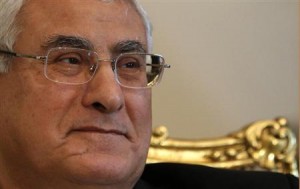 Egypt’s interim president named at least 18 new provincial governors on Tuesday, half of them retired generals, in a shake-up that restored the influence of men from army and police backgrounds and flushed out Muslim Brotherhood members.
Egypt’s interim president named at least 18 new provincial governors on Tuesday, half of them retired generals, in a shake-up that restored the influence of men from army and police backgrounds and flushed out Muslim Brotherhood members.
Deposed President Mohamed Mursi had appointed a number of civilians as provincial governors during his one year in office. Many of them were members of the Brotherhood. That marked a break with the Hosni Mubarak era, when the posts typically went to retired army and police officers.
The new appointees were sworn in by interim President Adli Mansour, head of the army-backed government which replaced the Mursi administration that was removed from power last month after mass protests against Brotherhood rule.
Critics said the line-up announced on Tuesday was a step backwards.
“It is Mubarak’s days,” prominent blogger Alaa Abd El Fattah wrote on his Twitter feed. “Down down with every Mubarak. Sisi is Mubarak,” he added, referring to General Abdel Fattah al-Sisi, the army chief who deposed Mursi.
Mursi’s final days in office were marked by controversy fuelled by his decision to appoint a member of the Gamaa Islamiya, a once-armed Islamist group, as governor of Luxor, where members of the movement killed 58 tourists in 1997.
Mursi’s appointment of Brotherhood members as provincial governors fuelled accusations that his movement was staging a power grab – a charge the Brotherhood always denied but which added fuel the uprising against his rule.
Strong Egypt, a party led by former Brotherhood politician Abdel Moneim Abol Fotouh, described the shake up as “a step towards the militarization of the state that copied the approach of the Brotherhood”, Al-Ahram reported, quoting its spokesman.
In a meeting at the presidential palace, Mansour told the governors their priority was to improve public services, “provide essential commodities at appropriate prices, and bring about security in the Egyptian street”.
Writing on his Facebook page, Mohamed Abu Hamed, a former MP, said it was “a very positive step” towards implementing the army-backed roadmap that envisions parliamentary elections within about five months.
Reuters

Leave a Reply
You must be logged in to post a comment.